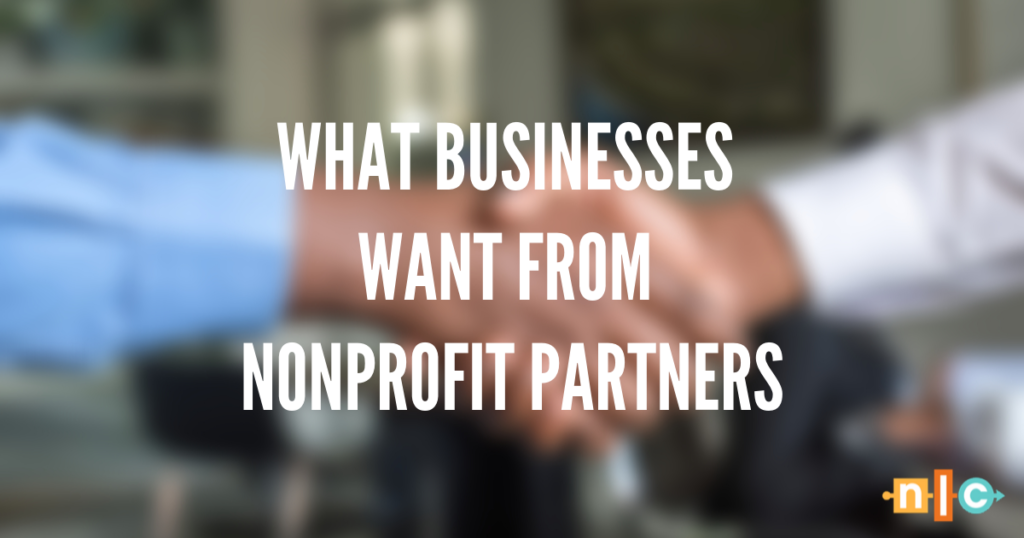If you’re like many nonprofits, you’ve heard the term Corporate Social Responsibility, or CSR. It’s the phrase used to refer to a business approach that aims to positively contribute to our society. While initially a form of corporate self-regulation to promote sustainable business practices, CSR is no longer a single-issue effort or ad hoc attempt by a company’s marketing department to do good. Among the latest corporate social responsibility trends, research from Edelman shows that 8 in 10 consumers believe businesses must play a role in improving the social conditions of the communities in which they operate. And doing so isn’t just good for our communities; it’s better for business. A Deloitte study found that purpose-focused companies outperform their peers by a factor of eight, while Kantar Consulting’s Purpose 2020 Report shows that brands with a high sense of purpose have experienced a valuation increase of 175% during the past 12 years.
There’s no question that CSR has evolved beyond a business function to the foundation on which great businesses are built. As corporate citizenship moves to the center of companies and both employees and consumers continue to demand it, nonprofits must take a more proactive and strategic approach when it comes to partnership. CSR expert and communications strategist Kecia Carroll believes that when nonprofit leaders think about CSR from a corporate perspective, they form more meaningful partnerships that translate into increased donations, volunteerism and action. To understand how corporate social responsibility is shifting so nonprofits can shift with it, Kecia shares six corporate social responsibility trends every nonprofit leader needs to know.

6 Corporate Social Responsibility Trends Every Nonprofit Needs to Know
1. From Sustainability to Sustained Social Impact
For many companies, especially early on, CSR and sustainability were synonymous. The responsibility was about preserving resources and operating in a way that was conducive to the environment. Today, CSR encompasses environmental, economic and social responsibility and refers to businesses’ responsibility to act ethically and consider their impacts on the community at large. Successful business leaders think in terms of their return on investment. CSR is now evaluated based on its ability to deliver measurable business results — from deeper employee engagement or enhanced reputation to community health metrics.
Nonprofit leaders must think strategically about how corporate support can drive true community and business results. When thinking about ROI for your partners, go in prepared to listen, not ready to present a list of sponsorship opportunities. By working together to find win-win strategies that drive real results, you’ll create transformational partnerships to advance long-term impact.
2. From Responsible Business Operations to Brands Taking Stands
In recent years, companies have redefined what responsible business operations mean by going from supporting causes to taking stands as brands tied to their corporate values. Today, 62% of consumers want companies to take a stand on current issues, while research from Cone Communications shows that 78% of employees expect companies to stand up for important social justice issues. From Dick’s Sporting Goods taking a stand on gun control to Patagonia standing up for our nation’s outdoor spaces, companies and customers are demanding philanthropic partnerships that prioritize authentic values and action.
As a nonprofit leader, jot down the social problems your organization is working to solve. Think beyond your stated mission. Research or consider which companies might (or should be) trying to solve the same problem you’re trying to solve. Study those companies, identify champions within those organizations and set up an initial meeting to discuss their needs, goals and potential opportunities to work together to advance them.
3. From Nice-to-Have to Non-Negotiable
Employees and job applicants expect CSR to be engrained into the fabric of their company’s corporate culture. Nearly 55% of the workforce would choose to work for a socially responsible company, even if the salary was less. Millennials in particular, which make up the largest segment of the American workforce, are seeking out and staying with companies that are proactive and collaborative in their community giving. While companies are mindful of doing good, an authentic CSR strategy is imperative to recruiting and retaining today’s best talent. According to HR Executive, turnover at companies where employees donated money and volunteered was only 12% compared to 28% at other organizations where they did neither. Nonprofits can play a critical role in helping corporate partners not only demonstrate that they’re a purpose-led brand, but also showcase the partnership as an employee benefit.
4. From Volunteering to Skilled Volunteerism
Speaking about employee expectations, effective CSR includes engaging employees in meaningful ways that matter to them. A 2017 study by Deloitte found that creating a culture of volunteerism may boost morale, workplace atmosphere and brand perception. Furthermore, a 2016 Cone Communications Employee Engagement Study showed that 71% of employees want their company to provide opportunities for them to help make a positive impact on its social and environmental commitments — 88% confirm their job is more fulfilling when they do. Nonprofit leaders must be able to articulate a need for skilled volunteerism to engage today’s corporate partners. For instance, nonprofits must show how volunteerism can empower employees to use their unique skills to solve problems, develop leaders and teams and/or reach new or diverse markets. For example, IT experts might help tomorrow’s leaders learn about coding while the mechanically-inclined could help assemble bikes for kids in need.
5. From Big Company to Any Company
The strategic principles behind CSR apply to any company of any size, starting with its goals, values and purpose. Every company got into business for a reason, with a problem they sought to solve or a need they hoped to meet. In addition to this becoming the foundation of their business, it serves as the basis of any corporate social responsibility program. By tapping into the heart of what a company does best, or why they do what they do, you’ll create authentic strategies that advance deeper impact. That means companies of every size may be a match for your organization, so don’t overlook businesses that are hard-wired to care about your cause. Not all companies have deep pockets, but they can all have deep impact.
6. From Tactic to Strategy
Regardless of a company’s size or strategy, corporate social responsibility is more effective with a plan. To build an effective, sustainable CSR program, top companies are approaching it as strategically as possible. Specifically, they’re tying the nonprofits they support to their business objectives, values and overall purpose. They are looking at authentic alignment with their brand. They want to be engaged beyond writing checks and they want their impact to be sustainable and measurable. When putting together proposals and programs for current and potential corporate partners, addressing these elements are critical for every nonprofit.

